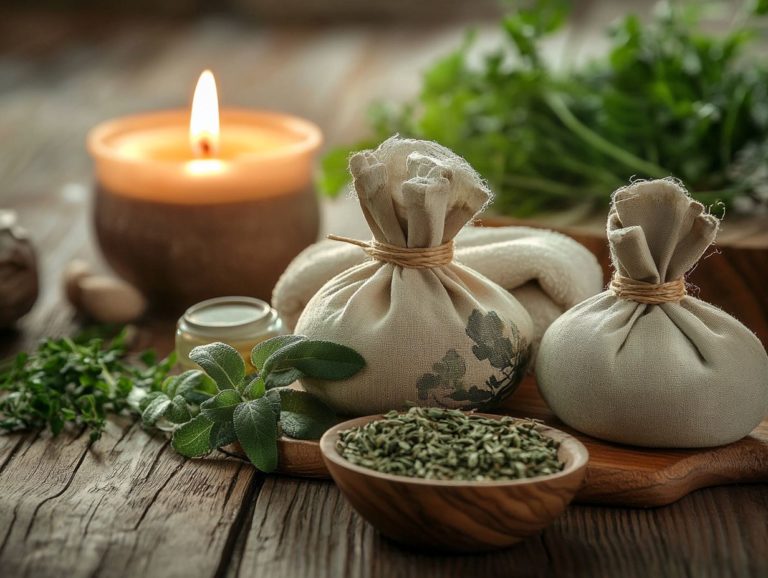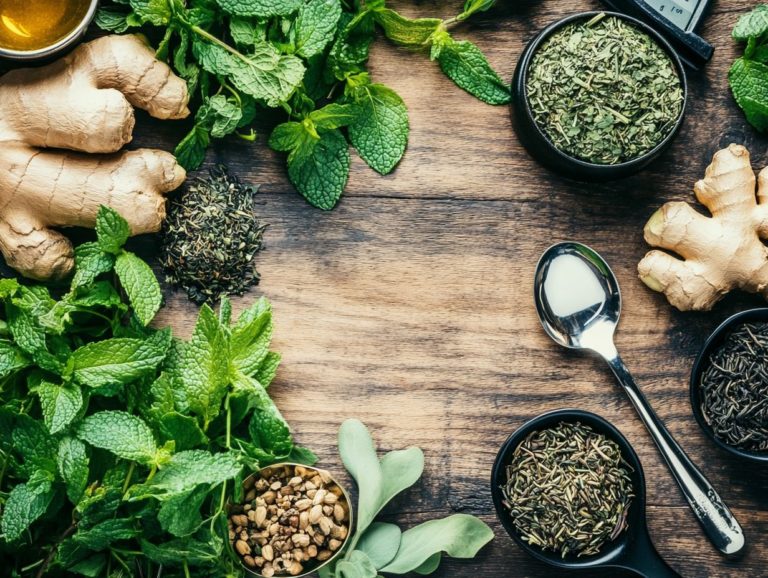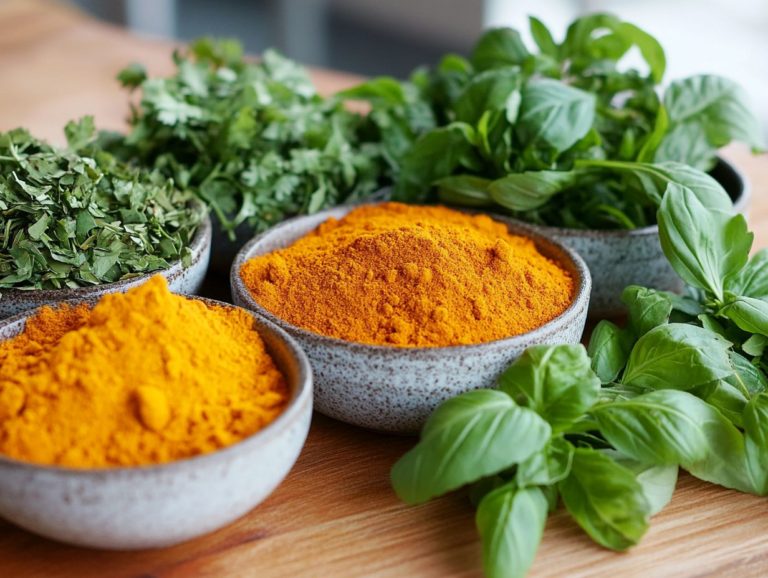Do Herbal Remedies Have Age Restrictions?
Herbal remedies and herbal medicines have surged in popularity as natural alternatives to conventional medicines. Their use comes with essential guidelines, particularly concerning age.
Discover the benefits of herbal remedies, their advantages for different age groups children, adults, and the elderly and the potential risks associated with their usage.
This article delves into common age restrictions, highlights the unique advantages these remedies can provide, and underscores the importance of consulting with a healthcare provider.
Learn how to navigate the realm of herbal remedies and natural solutions effectively.
Contents
- Key Takeaways:
- Understanding Herbal Remedies
- Age Restrictions for Herbal Remedies
- Benefits of Herbal Remedies for Different Age Groups
- Potential Risks and Side Effects
- Consulting with a Healthcare Provider
- Frequently Asked Questions
- Do Herbal Remedies Have Age Restrictions?
- What age group is most affected by age restrictions for herbal remedies?
- Are there any herbal remedies that are safe for all ages?
- Why do some herbal remedies have age restrictions?
- How can I find out if a specific herbal remedy is safe for my child?
- Are age restrictions for herbal remedies always the same across different countries?
Key Takeaways:

- Herbal remedies and herbal products can have age limits due to their ingredients and potential risks for certain groups.
- Children, adults, and the elderly may benefit from herbal remedies, but consulting a healthcare provider before use is essential.
- Herbal remedies may interact with medications or cause allergies, making it crucial to seek professional medical advice before use.
Understanding Herbal Remedies
Understanding herbal remedies invites you to explore a rich tapestry of herbal medicine history and traditional practices that have spanned centuries and cultures.
These natural solutions derive their strength from the helpful parts of the plants, underscoring the critical role of safety checks for herbal products in ensuring their effectiveness.
In today s landscape, herbal remedies are emerging as a compelling complement to conventional medicines, offering an overall wellness approach. This growing interest has led to scientific research to support their benefits and uncover potential interactions with pharmaceutical drugs.
What are Herbal Remedies?
Herbal remedies are therapeutic products crafted from plants, using their natural compounds to enhance health and address various conditions.
These remedies typically include leaves, roots, flowers, and seeds, each harnessing the unique properties of its respective plant. Renowned for their rich blend of vitamins, minerals, and natural substances in plants, herbal remedies are increasingly sought after for issues such as digestive disorders, anxiety, and inflammation.
In contrast to conventional medicines, which often come with side effects and synthetic ingredients, herbal solutions provide a more gentle approach to healing. Many individuals find that integrating these natural alternatives can effectively alleviate chronic illnesses, promoting their overall well-being.
Age Restrictions for Herbal Remedies
Age restrictions for herbal remedies are vital for ensuring the safety of different age groups, particularly considering the distinct health challenges faced by children, adults, and the elderly.
While many herbal products can offer significant benefits, they may carry potential issues depending on your age and health status. This highlights the necessity for careful consideration of dosage and the importance of consulting a healthcare provider before use.
Don t wait! Consult your healthcare provider today to see how herbal remedies can work for you!
Common Age Restrictions
Common age restrictions for herbal supplements often advise caution for both children and the elderly, considering their unique health profiles and potential for adverse reactions.
For instance, many herbal products, like those containing echinacea or ginseng, can present risks such as allergic reactions or interactions with prescription medications that older adults frequently take. It’s important to consider whether herbal remedies are safe for children, as they may also experience negative effects from potent herbal formulations while still in the process of development.
This could lead to issues such as stomach issues or hormonal imbalances related to herbal supplement use. Given these safety considerations, it s crucial for everyone to consult healthcare providers before trying any new supplement.
These professionals can offer personalized guidance and ensure that the chosen herbal options are suitable for one s health status, nutritional requirements, and overall herbal medicine safety.
Benefits of Herbal Remedies for Different Age Groups

Herbal remedies and herbal supplements present a wealth of benefits designed to cater to various age groups. They enhance overall health and address specific health conditions in children, adults, and the elderly alike.
- Children: Certain herbal supplements can fortify the immune system.
- Adults: Others may enhance cognitive function in older adults.
This versatility and effectiveness of herbal products truly demonstrate their value across different age demographics.
Children
Herbal remedies can be particularly advantageous for children, offering natural compounds that support their developing immune systems.
Consider remedies like chamomile, which soothes digestive discomfort, or elderberry, known for boosting immunity. These alternatives provide gentle options compared to conventional medications.
Caregivers must proceed with caution. Always consult a healthcare professional before introducing any new herbal treatments.
Proper dosage is crucial, as children metabolize substances differently than adults. These natural solutions not only aim to alleviate symptoms but also tap into the body s innate ability to heal.
This holistic approach is perfect for parents seeking to nurture their child s well-being.
Adults
For adults, herbal remedies present a sophisticated solution to a myriad of health concerns, ranging from stress management to enhancing metabolic functions.
You may find yourself drawn to herbal supplements like ashwagandha for effective stress relief. Others might discover the benefits of milk thistle for bolstering liver health.
These natural options offer potential therapeutic effects and contribute to a more vibrant and balanced lifestyle through herbal medicine effectiveness. It is essential to prioritize safety precautions when integrating these remedies into your routine.
Some herbal products can interact with conventional medications. Thus, seeking knowledgeable consultation with a healthcare provider is highly advisable.
This ensures that your use of herbal interventions is both effective and safe, taking into account the potential benefits and any interactions you need to be aware of.
Elderly
Elderly individuals can reap significant benefits from herbal remedies, especially those that address chronic health conditions. However, it s essential to pay close attention to safety precautions and potential adverse reactions related to herbal supplements.
Herbs like turmeric and ginger help alleviate pain and enhance mobility, contributing to overall health. Ginkgo biloba is celebrated for boosting cognitive function and improving circulation, making it a valuable ally in managing symptoms of dementia and memory loss.
Despite these advantages, it’s vital to understand that herbal remedies can interact with conventional medications. This may lead to negative effects or reduce their effectiveness. Therefore, always consult your healthcare provider before starting any herbal supplements and refer to herbal remedies: safe dosage for adults and children to ensure a safe and effective approach tailored to your health needs.
Potential Risks and Side Effects
While herbal remedies can offer many benefits, it’s crucial to consider the potential risks and side effects. Be alert to any adverse reactions or interactions they may have with your prescription medications.
Your well-being deserves careful consideration.
Interactions with Medications

Interactions between herbal remedies and prescription medications can lead to negative effects. It’s crucial to seek medical advice before using herbal supplements to ensure safety.
Take St. John’s Wort, for example. While it’s popular for mood enhancement, it can significantly reduce the effectiveness of certain antidepressants and birth control pills. Similarly, ginkgo biloba may increase the risk of bleeding when taken alongside anticoagulants like warfarin.
These examples highlight the importance of consulting healthcare providers. They can offer personalized advice based on your medical history and current medications. Integrating herbal remedies without expert guidance risks diminishing your treatment efficacy and poses serious health threats. Always approach this with a well-informed mindset.
Allergies and Sensitivities
Allergies and sensitivities to herbal remedies can lead to significant side effects. This emphasizes the importance of taking safety precautions as you explore these natural options.
If you have known allergies, especially to plants or pollen, approach herbal treatments with care. Common allergens in herbal remedies include:
- Chamomile
- Echinacea
- Ginseng
Symptoms can range from mild skin irritations to more severe respiratory issues. Therefore, thoroughly research each herb and consult a healthcare professional before adding new remedies to your regimen.
Starting with small doses and monitoring any adverse reactions can help you navigate the world of herbal supplements safely. Keeping a journal of your physical responses can be invaluable in managing sensitivities effectively.
Consulting with a Healthcare Provider
Consulting a healthcare provider is crucial when considering herbal remedies. Their professional guidance ensures safe and effective use and tailors the approach to your unique health needs.
Start your journey to better health with safe herbal choices!
When to Seek Professional Advice
You should always seek professional advice from a healthcare provider when considering herbal remedies, especially if you have underlying health conditions or are taking prescription medications. This step is essential because certain natural supplements can interact negatively with conventional drugs, potentially leading to ineffective treatment or adverse reactions.
If you have conditions like diabetes (high blood sugar) or hypertension (high blood pressure), you need to tread carefully. Some herbs might unexpectedly alter your blood sugar or blood pressure levels.
Consulting a healthcare professional is vital to ensure that the remedy you choose aligns with your health goals and doesn t worsen any existing issues. Prioritizing safety through professional guidance helps you understand the different types of herbal options, ensuring you make informed choices that truly support your health.
Frequently Asked Questions
Do Herbal Remedies Have Age Restrictions?

Yes, certain herbal remedies may have age restrictions due to potential side effects or interactions with medication.
What age group is most affected by age restrictions for herbal remedies?
Age restrictions for herbal remedies may vary, but they usually aim at children and older adults.
Are there any herbal remedies that are safe for all ages?
Yes, there are some herbal remedies that are generally considered safe for all ages, such as chamomile for calming and ginger for nausea.
Why do some herbal remedies have age restrictions?
Some herbal remedies may have age restrictions due to their potency or potential interactions with certain health conditions or medications.
How can I find out if a specific herbal remedy is safe for my child?
You can consult with a healthcare professional or conduct thorough research on the specific herbal remedy to determine if it is safe for your child’s age and health status.
Are age restrictions for herbal remedies always the same across different countries?
No, age restrictions for herbal remedies may vary depending on the laws and regulations of each country. Make sure to research and follow the guidelines of your specific location.






